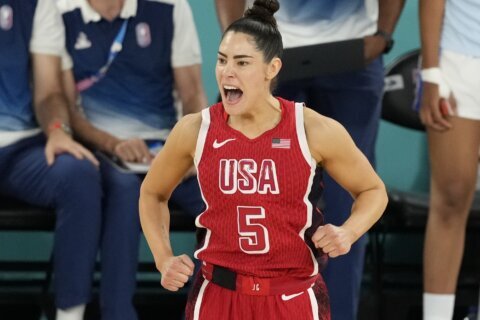Relationships are a core part of everyday life, especially for young people. As they move through their teens, some students begin to explore romantic relationships. While this can be an exciting and happy time, risks are also involved.
According to the Centers for Disease Control and Prevention, about 16 million women and 11 million men who report experiencing intimate partner violence say it first happened before they were 18. These include instances of physical violence, sexual violence and stalking.
Youth who are female, LGBTQ or unsure of their gender identity are all at a higher risk of experiencing youth intimate partner violence, also known as teen dating violence, the CDC says.
Healthy relationships programs in schools aim to prevent or reduce teen dating violence by increasing awareness. “The only way we will change these statistics is if we get ahead of the issue and teach people earlier how to identify — and what to do when they see — the signs of an unhealthy relationship in their or their friends’ lives,” says Megan Shackleton, chief program officer at One Love, a national nonprofit that seeks to end relationship abuse.
What a Healthy Relationships Curriculum Looks Like
While most schools offer some form of sex ed, lessons specifically around healthy relationships are harder to find.
“Healthy relationship curriculum is still quite rare, but there has been some recent progress,” says Samantha Saunders, a licensed professional counselor specializing in trauma and relationships. Some states — such as California, Nevada, New Jersey, Oregon and Virginia — now direct school districts to include content on healthy relationships and consent within their sex education programs.
Whether as part of a sex ed or health class or a standalone intervention, healthy relationships curricula typically cover positive communication skills, consent, how to recognize healthy and unhealthy relationships, and available resources for those in an abusive or potentially abusive situation.
Some programs, like the workshops provided by One Love, are inclusive of LGBTQ relationships and include discussions of gender identity.
A range of nonprofit providers offer programming for K-12 schools, including:
— Relationship Abuse Prevention Program (RAPP) and Early RAPP: Offers classroom-based education on healthy relationships and signs of abuse to dozens of middle and high schools across New York City. Young people also have the opportunity to learn more during a paid peer leadership summer program.
— One Love: Conducts free trainings nationwide for local educators and young people to conduct film-based workshops for their peers about healthy relationships, signs of abuse and bystander interventions.
— Safe Dates Matter: A Pennsylvania-based initiative to educate teens on healthy dating practices, signs of abuse and avenues to access help.
— Women Helping Women: Prevent and Empower programs run for five or 10 days and provide education on teen dating violence prevention to over 25 schools in Ohio.
[READ: How Schools Incorporate Social-Emotional Learning]
Why Teaching About Healthy Relationships Matters
Research on the effectiveness of healthy relationships programming is limited. A 2021 study of one dating violence prevention program used in Texas middle schools, The Fourth R, found that participants experienced lower rates of physical relationship abuse for at least a year after the intervention, compared to students who did not receive the program. Older studies have found that similar programs improved students’ awareness of and attitudes about dating violence, though they didn’t significantly affect rates of dating violence.
Even if programs can’t prevent incidents of violence from occurring, teaching young people about the signs of unhealthy relationships and the resources available makes them better equipped to respond when needed to help their friends and themselves, experts say.
“We know that young people repeat behaviors and patterns they are exposed to,” says MaryAnn Van Nostrand, director of the Relationship Abuse Prevention Program. Programming like RAPP “allows young people to explore their behaviors and beliefs regarding relationships and rewrite healthier narratives on how to relate to themselves and others,” she says. That can be not only in romantic relationships, but also with peers, family members or fellow community members, she says.
Education around healthy relationships can also help dismantle damaging norms, Shackleton says. “As a society, we have normalized so many unhealthy relationship behaviors that are key early warning signs of abuse — possessiveness, intensity, guilting,” says Shackleton. “We need young people to understand that these behaviors are not OK.”
Barriers to Healthy Relationship Education in Schools
Several factors can make it challenging for schools to implement a healthy relationships curriculum, including:
Stigma and Parental Opposition
Many parents consider discussing romantic relationships or intimacy taboo or inappropriate for school, says Saunders, which can lead schools to avoid the topic. Even in cases when the law mandates education on healthy relationships, it’s generally up to the schools to determine exactly what they teach. Experts say that can mean some programs are not comprehensive, leaving out important but complicated topics like emotional abuse or how to set boundaries.
A Lack of Staff and Time
Even if a program exists and is approved, there may not be enough time or staff to run it. Van Nostrand says there aren’t enough RAPP clinicians to serve all of New York City’s schools, for example.
One Love trains the trainer, educating people such as students and teachers to run workshops for young people where they live. “This, therefore, requires educators to have both the time to get trained and the time in their class schedule to lead the education,” says Shackleton, which can be a challenge.
[READ: The Benefits of Mental Health Programs in Schools.]
Resources for Parents
Whether or not your child’s school covers this topic, experts say talking to your kids about healthy relationships is valuable.
“I recommend talking with your kids about how communication works in a relationship as well as consent, boundaries, respect, trust and honesty,” says Saunders. While some parents may find this uncomfortable, she says “taking the time to discuss these topics will ensure that your kids have all the necessary tools they need when it comes time for them to navigate their own relationships in the future.”
There are a number of resources to help you navigate these conversations. For instance, in New York City, RAPP facilitates workshops specifically for parents who are unsure where to start or want to learn more about healthy relationships themselves. One Love’s Start the Conversation guide provides sample questions and resources for leading a conversation on healthy and unhealthy relationships with your kids. And the website Amaze offers parent advice and animated videos to spark discussion on sex and relationship topics.
If you suspect your child is already involved in an abusive or potentially abusive relationship, the National Domestic Violence Hotline has tips on how to talk to your teen. You or your child can also get support from an advocate at Love Is Respect, a project of the hotline specifically for young people, by visiting the website, calling 866-331-9474 or texting LOVEIS to 22522.
And if you don’t have the answer to something your child asks, be transparent about it, says Van Nostrand. It’s an opportunity to look into and learn this together.
More from U.S. News
Understanding School-Based Mental Health Services
How Schools Contribute to Negative Body Image in Kids
Addressing Teen Dating Violence in Schools originally appeared on usnews.com







